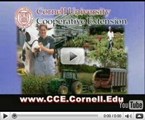Posted 8/9/2010
by Pat Leonard

Pat Leonard, staff writer at the Cornell University's Lab of Ornithology, published this story on July 12th on the Cornell News Service.
Out of sight, whales cruise the Gulf of Mexico depths -- their hidden world threatened by huge clots of drifting oil from the ruptured Deepwater Horizon well. At the same time, there is almost no data available to measure changes to the Gulf's ecosystem -- including whale populations -- caused by the massive leak. "You wonder 'What can we do? What's the impact of this?' In the case of marine mammals, we don't know because we don't even know what's there" said Christopher Clark, head of the Bioacoustics Research Program at the Cornell Lab of Ornithology.
Clark and his team are collaborating with the National Oceanic and Atmospheric Administration (NOAA) in a multipronged effort to discover the numbers and locations of whales and assess the potential impact of oil clouds drifting below the surface -- a by-product of the oil spill and the dispersants used to break up the oil slick. The team will anchor 22 marine autonomous recording units (MARUs) to the sea floor in an arc stretching from Texas to western Florida, along the edge of the continental shelf. These units will record underwater sounds for three months before they receive a signal to let go of their tethers and pop to the surface for retrieval. After analyzing the data, the team will deliver a report to NOAA and other agencies involved in the oil leak response.
The MARUs will listen for endangered sperm whales and a small population of Bryde's (BRU-des) whales. They will also pick up sounds of fish and ship traffic. Some devices will be placed in areas apparently unaffected by the oil to collect "control" site information; others will be close to the gushing well. The goal is to document the state of the sounds in the ecosystem over an extended period of time and compare them with known information of the oil spill.
"This will be the first large-scale, long-term, acoustic monitoring survey in the Gulf of Mexico," Clark said. "We can provide one more layer of understanding about this ecosystem, using sound to measure animal occurrences, distributions and communication, as well as background noise levels from shipping and weather, and perhaps visualize how these features are being influenced by the oil. The whales are like oversized canaries in the coal mine -- they reflect the health of the environment they live in."
Clark says sperm whales are ideal subjects to monitor. They are big, and they hunt for squid at great depths (about 1,000 meters down) using echolocation. Once they detect prey, they emit a very rapid sequence of clicks. By measuring the number of clicks in a given time period, scientists learn about the whales' hunting success and may estimate how many animals are nearby.
Clark is also seeking funding to use free-floating recording units to record the ocean's electrical conductivity -- a measurement directly related to how much oil is in the water. Such a device could also continuously record ocean sounds and help researchers confirm how many animals inhabit oiled parts of the gulf. Clark feels strongly that even after the current set of recording devices is removed in early October, others should be deployed to continue monitoring throughout the year.
Posted 8/2/2010
by Karen Kosinski

4-H member Molly Monge raised pheasants from chicks she received in May through the 4-H Pheasant Rearing Project. She learned about caring for an animal, the wild habitat of a pheasant and the pheasant's characteristics. She is pictured here just prior to releasing the grown pheasants to the wild, the final step in the 4-H project. Molly will write about her learning experience in her 4-H Member Project Record Book, which will be submitted to the 4-H office in October.
Posted 7/29/2010
by Paula Schaffer

Late Blight was confirmed on both tomatoes and potatoes on July 27, 2010. Grown in a home garden in the city, the sample was collected on July 25 after the entire crop of tomatoes died almost overnight. Nearby potatoes are also infected.
In an effort to avoid the catastrophe that happened last year, gardeners are asked to please monitor tomatoes and potatoes in earnest. Look for dark watery lesions on the leaves, stems and fruit. Late blight spreads quickly. Cornell recommends “If late blight becomes severe, remove diseased plants by digging them up. Destroy these plants immediately by one of the following: burying them deeply in an area away from the garden, burning them, or by bagging them in a plastic bag and discarding the bag. These steps will help avoid production of a larger number of spores. Harvest all potato tubers in the garden. If late blight occurs when the tubers have already 'sized up', harvest the crop as soon as possible to avoid post-harvest tuber rot. Again, destroy diseased foliage and stems.”
There are fungicides that can be sprayed to prevent infection, but once severe infection has taken hold, chemical controls will not work. Commercial growers should check http://www.nysaes.cornell.edu/recommends/ for the latest pesticide recommendations.
Posted 7/27/2010
by Ted Boscia, Assistant Director of Communications for the College of Human Ecology

Whether mom's golden child or her black sheep, siblings who sense that their mother consistently favors or rejects one child over others are more likely to show depressive symptoms as middle-aged adults, finds a new study by Cornell gerontologist Karl Pillemer.
Prior research has shown that parental favoritism among siblings negatively affects mental health and often triggers behavioral problems in children, teens and young adults, but the survey of 275 Boston-area families, co-directed by Purdue sociologist Jill Suitor, is the first to show that such harmful effects persist long into adulthood.
"Perceived favoritism from one's mother still matters to a child's psychological well-being, even if they have been living for years outside the parental home and have started families of their own," said Pillemer, the Hazel E. Reed Professor in the Department of Human Development and associate dean for extension and outreach in the College of Human Ecology, about his paper in the Journal of Marriage and Family (April 2010).
Posted 7/26/2010
by Craig Clark

In an effort to protect the state’s one billion ash trees, New York State Department of Environmental Conservation Commissioner Pete Grannis is reminding summer campers and others not to move firewood. On his blog, The State of Green, Grannis reminds people that an invasive wood-boring beetle, the Emerald Ash Borer (EAB), is threatening ash trees in 14 states, including New York, and two Canadian provinces.
Currently restrictions are in place in New York prohibiting the transportation of untreated firewood more than 50 miles from its source.
EABs are not great flyers. According to the New York Invasive Species Information website, the natural spread of EABs “in North America is assumed to be 5 miles or less per year.” As the beetle can’t cover much ground on its own, the massive spread of the EAB has been linked to the transportation of infested logs and firewood by humans.
EABs were first discovered in New York in Cattaraugus County in June 2009. Following the discovery, Grannis says, DEC placed 7,500 sticky, purple, triangular traps in Ash trees across the state.
Posted 7/20/2010
by Tom Vilsack, U.S. Secretary of Agriculture

Where does your food come from and how does it get to your plate? For many Americans this is a question that is becoming more and more difficult to answer as they become further removed from the farm and less connected to agriculture. The hard work that goes into producing our nation’s food supply is being taken for granted.
We cannot let our children grow up thinking that food comes from a grocery store. That’s why I started the Know Your Farmer, Know Your Food initiative last year. As outlined in USDA’s new strategic plan, the initiative offers an innovative environment for us all to learn, share, and problem solve together. Washington doesn’t have all the answers, so I want to invite you to join us in a national conversation.
Know Your Farmer not only focuses on connecting consumers to producers, it also focuses on local and regional food systems, as they represent a new and rapidly growing market for many producers. While only 4% of farmers sell through direct-marketing channels, that number is growing and direct to consumer sales have more than doubled in recent years, from $551 million in 1997 to $1.2 billion in 2007.
Posted 7/13/2010
by Ellen Abend, NY EDEN

This hot summer weather means that many people will be swimming, boating and participating in other water-related recreational activities. We all may have misconceptions about what a drowning person looks like and does. Below is a link to an article that has important information to share with family, friends and colleagues.
Drowning Doesn’t Look Like Drowning by Mario Vittone (June 16, 2010): http://gcaptain.com/maritime/blog/drowning/?10981
Posted 7/9/2010
by Karen Kosinski

Cool and tart or crisp and sweet – you can find pickled vegetables, fruits, or even meats on almost every dinner table. Pickling is the oldest way to preserve the local harvest.
The Nutrition and Health Program of Cornell Cooperative Extension in Fulton and Montgomery Counties will present “Pickling” on Tuesday, July 20th, 6:00-8:00 p.m. Nutrition Program Educators and Master Food Preservers Eileen Lang and Norma Maring will teach the class in the Extension Teaching Kitchen, 55 East Main Street, Lower Level, Johnstown.
This class will focus on the pickling and boiling water canning process for pickled vegetables, relishes and chutneys. The basics of selecting and using proper food preservation supplies and equipment will be covered as well. This is the last time this class will be offered this year.
Posted 7/7/2010
by Karen Kosinski

Canning Tomatoes using Water Bath Method class coming next Tuesday, July 13th. 6-8 p.m. Sign up on Facebook event RSVP or call 518-762-3909 x 101. $15 per person. Learn the current USDA recommendations to avoid spoilage. Take this class before tomatoes become plentiful so you will be ready to can some of that great taste!
Posted 7/7/2010
by Marilyn J. Smith

Here's some good information from the Center of Disease Control:
Elderly people (that is, people aged 65 years and older) are more prone to heat stress than younger people for several reasons:
- Elderly people do not adjust as well as young people to sudden changes in temperature.
- They are more likely to have a chronic medical condition that changes normal body responses to heat.
- They are more likely to take prescription medicines that impair the body's ability to regulate its temperature or that inhibit perspiration.












